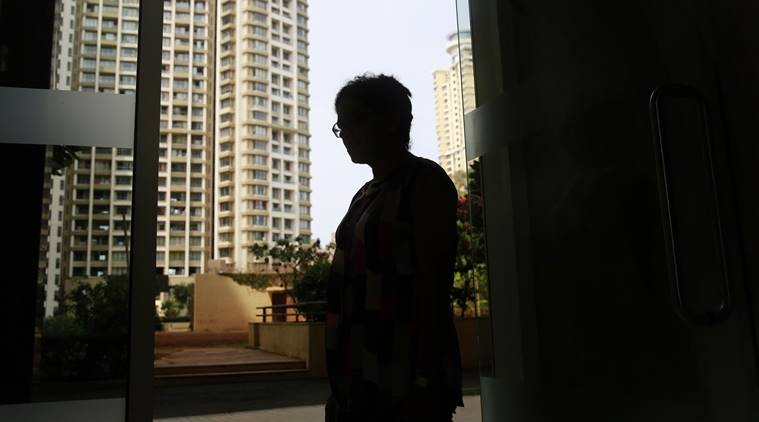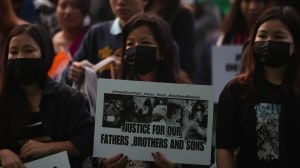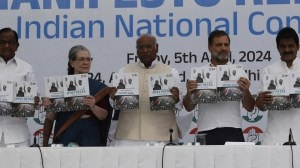- India
- International
Sex and sexual abuse : No way out in the world of accusatory Lists
I refuse to name and shame the man who molested me as a 23-year-old, though the joke is on us if he is more innocent than ever because of his name appearing on this List.
 A life that is not simply determined by the world, rather is produced through its contradictory forces. Before I forget to mention — I am also a ‘survivor’; of protracted child abuse and molestation as an adult (Representational Image/ File)
A life that is not simply determined by the world, rather is produced through its contradictory forces. Before I forget to mention — I am also a ‘survivor’; of protracted child abuse and molestation as an adult (Representational Image/ File)
Since this seems to be the season of declarations and pronouncements – I would like to make a few about myself. I am a 30-year-old woman, a student at Jawaharlal Nehru University, fairly fun loving, sometimes crabby and at other times pleasant, healthily flirtatious, fiercely independent but also mildly attention seeking. I lie many times – sometimes out of compulsion and at others owing to necessity. On some days I find myself riveted with sexual banter with probable and improbable partners and on other days, I feel bored beyond belief. I am in constant excruciating awareness of ‘ego problems; within myself, but I also have the special talent of being able to smell condescension and entitlement in others from a mile away. I have found my preferences in music, food, films, people, travel and sex change quite significantly over the years. This change and its awareness, I think, is the essence of a political life.
A life that is not simply determined by the World, rather is produced through its contradictory forces. Before I forget to mention — I am also a ‘survivor’; of protracted child abuse and molestation as an adult. What makes me, perhaps, even more, declarable is that one of the men who molested me, a teacher at Delhi University, was on the name and shame list compiled and published by a fellow student, Raya Sarkar.
When first confronted with this list and the larger context of the Harvey Weinstein disclosures, I did wonder if joining voices with several young women across institutions should be a natural thing to do. Especially since mechanisms to address and curb sexual violence within them are often found to be dysfunctional and even hostile. Further, many of the accused seemed to have had some kind of cultural and intellectual clout, which is sometimes enough to both attract and intimidate young(er) women colleagues and students.
What made the List even more appealing at first sight was that this anger had been sparked off (in part) due to excellent investigative journalism conducted by Emily Steel, Micheal Schmidt, Katie Benner, Jodie Kantor and Meghan Twohey — all writing for the ‘New York Times’ and reporting on the culture of violence and impunity within ‘Fox News’, Silicon Valley, and Hollywood respectively.
Their writing empowered many people across the world because, it seemed, that the workings of sexual violence in a modern, technologized and liberal society were being finally laid bare. In the spirit of responsible journalism, there was a detailed description of the violence perpetrated on survivors, accounts of multiple survivors, thorough observations on contracts and clauses (that make reporting abuse at the workplace even more difficult), references to emails, text messages, hotel reservations, non-disclosure agreements, settlement packages and even eyewitness accounts.

What made these exposes compelling was that everything the survivors claimed and the investigations pointed towards was also presented to the accused as well as related institutions for their comments. Every single report and its follow up was interested in listening not only to women, but also to the men who had allegedly put them through humiliation and anguish. What one had, then, was a sensitive and rigorous model for hearing testimonies, looking at trails of evidence and asking for clarifications from those being accused of inflicting pain.
So even as Donald Trump, Bill Cosby and many other powerful people had got off the hook, these stories of sexual violence and abuse, on account of the work put into them, managed to bring real impact through termination of contracts and initiation of criminal suites. Several of these journalists have since revealed being intimidated and threatened by the powerful men they were investigating. But they and the publications for which they write have remained undeterred and taken complete responsibility for the names taken in their articles.
In an interview with ‘Variety’ magazine, Jodie Kantor was specifically asked a question about sources:
Q: Some outlets are now publishing stories about alleged harassers without any sources going on the record. That goes to issues of power and repercussions. Do you think it’s right that historically the accuser always had to go public if they wanted justice?
Kantor: It’s a fair question, and there are women who have said to us, & quote Why is it women’s work to do this? I didn’t do anything to get harassed. I was just showing up to work every day, so why is this my problem to solve?" We take that question seriously. We look for varieties of evidence. You could argue that on-the-record statements from women are the essential ingredient, but there are other forms of evidence too. There are internal documents. There are emails. There are human resources records. There is the settlement trail. We emphasize those other ingredients because we do want to take the burden off the women as much as possible.
What Kantor is saying becomes even more pressing when there is a greater eagerness to disbelieve women than to try and engage with their experiences. To try and find out more by asking more questions from both survivors and perpetrators, to attempt to back up statements with records and to confront gender-based social imbalance with ‘due process’ – that then becomes an act of empathy and courage.
Now turning to the publication in India of the List of 72 ‘sexual predators’; from the South Asia region, working in various academic institutions across the world. In spite of wanting to ally with those that have been violated — it is precisely for the reasons that the work of several journalists abroad moved me — that I have been distressed about the way things have unfolded here.
Much has already been pointed out about what was wrong in putting up a crowd-sourced, unverified list of names in the public domain without any sense of responsibility or accountability. Particularly alarming in this regard was the exchange between political theorist and historian Partha Chatterjee and lawyer-in-training and activist Raya Sarkar, where on being asked by Chatterjee why his name was on the List, Sarkar responded by saying that she had not paid much attention as she was in the middle of her exams. She added that she had been made the administrator for the List, but someone else could just as easily have been. I quote Sarkar’s response below:
“Dear Partha Chatterjee, I wasn’t updating the spreadsheet, Inji was. I deleted the spreadsheet since then, because it is an insecure way to report as Google Docs can be hacked easily. I made the list FIRST on FB (Facebook), then Inji put it all in a spreadsheet. Inji does not need to explain, maybe they weren’t following the threads closely, I don’t know. I was just made an admin (anyone can be made one). I wasn’t paying attention to the spreadsheet as I have midterms to study for and this has been very overwhelming for me. I haven’t kept track for which I apologize. However, if this is the only response, instead of taking accountability, then never mind.”
Further Inji Pennu (the person mentioned by Sarkar above), a journalist collating the list, wrote on Facebook, "I was more looking for university and state level as an aggregate. Not just single names, because to me that was not the point I was trying to arrive at."
Responsibility was at once being taken and shunned, the cause of voicing women’s distress in the absence of access to due course; was being reduced to a distracted game of passing the parcel, questions were being avoided from the ‘outside’; but also from other survivors.
Meanwhile, the list published by Malathi Kumari and compiled by Dalit-Bahujan activists which had names of several Dalit-Bahujan students and not just powerful savarna men, was met with complete silence, until a clarification was issued by Kumari herself on Facebook which said; “We are also caught unawares and alarmed by the irresponsible handling of this immensely serious issue by many, including ‘the list’ being put to use for settling scores and all kinds of casual vindictive purposes, which we never meant it to be.”
Try and picture how horrifying this must have been for someone like me, who has been molested by a man on the List, to realize the unethical casualness with which the names were being thrown around? Here I must also mention the statement issued on ‘Kafila’, only a few hours after the first List was published.
The post begins with establishing the political credentials of the signatories. It seems almost entirely myopic towards the driving force of this moment, where ‘unknown’ women who have been always been at the margins of feminist discourse, could come into the public domain to change conversations around women’s lives. While in essence, the statement was assuring women of support should they want to go through due process, the haste in asking for the List to be taken down seemed misplaced.
That it is almost impossible to remove any content from circulating on the Internet, is something that should have been a starting point for any response to the list. Now that these names were already on the Internet, the very valid concerns around an unverified naming of people could have been brought up by proposing other kinds of digital forums like discussion threads, group chats, mailing lists — these could have existed alongside and not in a real-time headlock with vigilante namers and shamers.
In this way, questions could have moved away from hierarchical claims on feminism and been more focused on accountability (and the necessity of its equal distribution between younger and older feminists alike) and avenues available for further conversation.
What was also equally counterproductive was witnessing older women being called names like “hag” which ironically comes from the practice of branding women as witches. The question of caste too was raised and then abruptly pushed aside; I have already mentioned the second list and its disappearance.
Imagine if names like Harvey Weinstein, Bill O’ Reilly, Chris had been floated without anything to back them up? The women who have suffered at their hands would have not only been let down but also discredited. The non-liability of these men would have been cemented.
I have heard many people say that at least now men will be careful or women warned. On the contrary, I feel the so-called ‘Raya Sarkar’ List has deepened the alienation of women who have been violated; especially those who refuse to let their anger cloud their judgment of what is ethical. Who refuse to speak in the brazen language of collateral damage.
It has created a distressing situation for women like me, for whom to ally with other women supporting the List would mean to stand on the side of injustice. There could hardly be anything more wrenching and unfortunate than this. Further what was being claimed, as only a cautionary list and aimed towards creating a whisper network, became an international media event. Suddenly this new movement had a celebrity leader who was being featured on platforms like ‘Buzzfeed’, ‘BBC’, ‘Newslaundry’, ‘Washington Post’, ‘Indian Express’ and other outlets.
The whisper was now a scream. These names had found their way into gossip networks all over the world, whether founded or unfounded didn’t really matter. In fact, alleged sexual predators and feminists objecting to the List were all collapsed into a cesspool, an unholy alliance of those trying to push all women into silence. The work of reclaiming their voices seemed to have fallen squarely on the shoulders of one or two women, or more specifically, on their social media profiles.
There are also a few other problems with the scenario that has been set up in the light of this list. Many of the younger women who I have spoken to since seem to be entering a feminist consciousness through an experience of trauma and sexual violation. This has created a feeling of a consensus around the female body that it is always, already under threat.
The List-driven movement shares the conception of this sexualized body with the oppressors that it claims to be fighting. A certain kind of biological essentialism seems to be at its heart. In what can now be looked at almost as a prophetic warning, Judith Butler talks about the need to do away with the gender or sex binary. That there is no “natural body” outside of cultural codes is something we need to remind ourselves, before we swing between the schizophrenic extremes of being hapless victims and bloodthirsty vigilantes.
The repeated stylisation of the body under a highly regulated “framework” that Butler points to as the basis of gender must be remembered before one starts to equate feminism primarily with the sexual body. To reduce intergenerational feminist debates to vengeful ageist slur hardly helps disassemble the structures that are oppressive to everyone who wants out.
I came to feminism as a place of nourishment, an affirmative embrace of the world. It is the joy produced by this embrace that helps one negotiate traumatic and violent experiences. It would be completely counterproductive to replace empowerment with trauma as the vector of political life — or worse to equate empowerment with revenge.
Feminism is a space where I could learn to love myself alongside being able to critically empathize with those whose experience was different from mine. Alongside radical speech feminism also taught me radical hearing, to hear voices that made me uncomfortable. It made me aware of history, so that I can wield it like a tool not as an excuse to hurl ideas of justice out of the window. By this logic, we should make no bones about criticizing Israeli foreign policy or ISIS, because the root of the violence they project into the world is their own violation and humiliation.
The counter to responses produced by men on the List has also been disquieting. I have already quoted the exchange between Partha Chatterjee and two of the Lists main administrators. A teacher from Jadavpur University in Kolkata was shot down as a ‘sophist’, his questioning of the data collection mechanism posited as proof of his guilt, while others were damned from the start for being friends of the ‘bad’; feminists who issued a warning against the methodology of naming and shaming. Another person was criticized, not because he was an abuser but was friends with a man who allegedly was.
Meanwhile, there are those men facing formal complaints in various institutions; including those against whom third-party allegations have been brought. That is, it is not the victim who has complained but someone else has done so on their behalf.
In the absence of anywhere to take up all these fundamentally different scenarios, no available forum in which lawyers and journalists and activists and just ordinary people helming this moment can trust and come together, no space to stop and evaluate the dangers of vigilante justice as well as the vicious climate of online bullying and trolling that it has produced – what is the accused and perhaps, even the accuser, supposed to do? Rot in their own private hell forever?
The victims in this narrative will always be scarred and angry and the accused always condemned to bear the brunt of social media kangaroo justice. In this world of Lists, there is no way out. There is an only vendetta, resentment, and instant gratification. This world looks a lot like the dystopic dark net of science fiction stories where the cult of the individual is aggrandized, even as all traces of their ethical accountable self are erased. Like the early days of the TV sting where prime-time audiences were judge and jury, this social media forum will make and break lives. Here everyone is guilty until proven innocent.
At the moment the din seems too loud to ask again questions about pleasure, about the possibility of intergenerational sexual relationships, about the possibility for men and women to refuse to play predictable roles of textbook victim and uncomplicated aggressor, about feminism and violence beyond the sexualized body, about the need to seduce and be seduced – all this while knowing never to accept or replicate violence.
And so I refuse to standardize and make consumable the chaos of my being and experiences for a social media handle. Perhaps the next time you see #metoo it may be worthwhile thinking about consequences of pruning away the messiness of the human experience to make way for a more streamlined society where “collateral damage” is not only accepted but glorified. After all question marks cannot be added to hashtags, at least not yet.
I refuse to name and shame the man who molested me as a 23-year- old, though the joke is on us if he is more innocent than ever because of his name appearing on this List.
EXPRESS OPINION
More Explained
Apr 25: Latest News
- 01
- 02
- 03
- 04
- 05











































